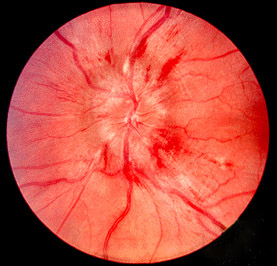Papilledema
Editor-In-Chief: Prab R Tumpati, MD
Obesity, Sleep & Internal medicine
Founder, WikiMD Wellnesspedia &
W8MD medical weight loss NYC and sleep center NYC
| Papilledema | |
|---|---|
| Synonyms | Papilloedema |
| Pronounce | N/A |
| Specialty | N/A |
| Symptoms | Headache, nausea, vomiting, visual disturbances |
| Complications | Vision loss, blindness |
| Onset | Sudden or gradual |
| Duration | Variable, depending on underlying cause |
| Types | N/A |
| Causes | Increased intracranial pressure, brain tumor, cerebral hemorrhage, meningitis, pseudotumor cerebri |
| Risks | Obesity, hypertension, pregnancy |
| Diagnosis | Fundoscopy, MRI, CT scan, lumbar puncture |
| Differential diagnosis | Optic neuritis, ischemic optic neuropathy, glaucoma |
| Prevention | N/A |
| Treatment | Addressing underlying cause, medications, surgery |
| Medication | N/A |
| Prognosis | Depends on cause and treatment |
| Frequency | Varies |
| Deaths | N/A |
Papilledema is a medical condition where the optic disc (the area at the back of the eye where the optic nerve enters) swells due to increased intracranial pressure. This condition can be a sign of serious medical conditions such as brain tumors or meningitis.
Causes[edit | edit source]
Papilledema is caused by an increase in intracranial pressure due to various conditions such as brain tumors, meningitis, hypertensive emergency, or idiopathic intracranial hypertension.
Symptoms[edit | edit source]
The symptoms of papilledema can vary depending on the cause of the increased intracranial pressure. Some common symptoms include headache, nausea, vomiting, blurred vision, and diplopia (double vision). In severe cases, it can lead to vision loss.
Diagnosis[edit | edit source]
The diagnosis of papilledema is usually made by an ophthalmologist using an ophthalmoscope to examine the back of the eye. Other tests such as MRI or CT scan may be used to determine the cause of the increased intracranial pressure.
Treatment[edit | edit source]
The treatment of papilledema is aimed at reducing the increased intracranial pressure. This can be achieved through medication, surgery, or other treatments depending on the cause of the increased pressure.
See also[edit | edit source]
Search WikiMD
Ad.Tired of being Overweight? Try W8MD's physician weight loss program.
Semaglutide (Ozempic / Wegovy and Tirzepatide (Mounjaro / Zepbound) available.
Advertise on WikiMD
|
WikiMD's Wellness Encyclopedia |
| Let Food Be Thy Medicine Medicine Thy Food - Hippocrates |
Translate this page: - East Asian
中文,
日本,
한국어,
South Asian
हिन्दी,
தமிழ்,
తెలుగు,
Urdu,
ಕನ್ನಡ,
Southeast Asian
Indonesian,
Vietnamese,
Thai,
မြန်မာဘာသာ,
বাংলা
European
español,
Deutsch,
français,
Greek,
português do Brasil,
polski,
română,
русский,
Nederlands,
norsk,
svenska,
suomi,
Italian
Middle Eastern & African
عربى,
Turkish,
Persian,
Hebrew,
Afrikaans,
isiZulu,
Kiswahili,
Other
Bulgarian,
Hungarian,
Czech,
Swedish,
മലയാളം,
मराठी,
ਪੰਜਾਬੀ,
ગુજરાતી,
Portuguese,
Ukrainian
Medical Disclaimer: WikiMD is not a substitute for professional medical advice. The information on WikiMD is provided as an information resource only, may be incorrect, outdated or misleading, and is not to be used or relied on for any diagnostic or treatment purposes. Please consult your health care provider before making any healthcare decisions or for guidance about a specific medical condition. WikiMD expressly disclaims responsibility, and shall have no liability, for any damages, loss, injury, or liability whatsoever suffered as a result of your reliance on the information contained in this site. By visiting this site you agree to the foregoing terms and conditions, which may from time to time be changed or supplemented by WikiMD. If you do not agree to the foregoing terms and conditions, you should not enter or use this site. See full disclaimer.
Credits:Most images are courtesy of Wikimedia commons, and templates, categories Wikipedia, licensed under CC BY SA or similar.
Contributors: Prab R. Tumpati, MD




